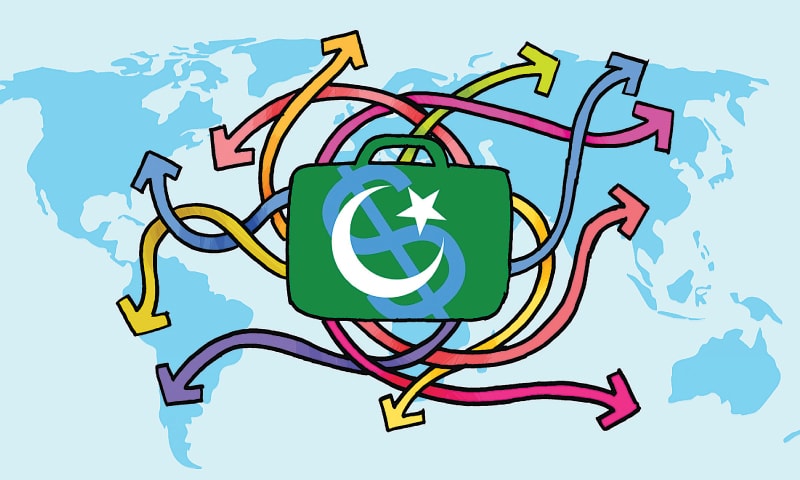PAKISTANI companies are expanding their footprints in markets beyond the country’s borders. About 500 of them are said to be active around the globe and many more are expected to join their ranks.
Besides real estate, many have aggressively invested in trading, mining, fertiliser, cement, textiles, pharmaceuticals, chemicals, plastic, food and technology companies. Their actual investment is projected to be many times more than the figure officially approved.
In FY13 (latest full year for which data is available), according to the State Bank, $198m were parked in direct overseas investment, $193m in equity and investment fund shares (including reinvested earnings), and $5m in debt instruments.
In 2008, overseas direct and equity investment amounted to $75m each, and there was no investment in offshore debt instruments. The five-year official data depict an accelerating trend, but the numbers are considered to be a fraction of the actual investment.
Local companies have expanded into countries in the Middle East (including Egypt), Far East and South Asia, as well as in Canada, the UK and the US.
Reports from Dubai earlier this year confirmed Pakistanis to be the second-biggest group of investors active in the UAE’s property market, having invested $4.7bn. Just the Canadian investment-based immigration visa costs $50,000. And the cost is double for the US.
There are reports that hundreds of young, business-class professionals have availed these options and many cases are said to be in the pipeline.
Board of Investment Chairman Miftah Ismail spoke about the government’s liberal policies. “The law obligates businessmen to seek the SBP’s permission to transfer capital beyond $5m for foreign investment. For overseas projects that cost over $10m, clearance of the Economic Coordination Committee of the Cabinet is required. In most cases, the permission is granted,” he commented over phone from Islamabad.
“In Sindh, security is not as much of an issue as governance. There is no point in dealing with the exodus of capital and the concerned businessmen administratively. There will always be some businessmen with global ambitions, and I see nothing wrong if Pakistan emerges as a strong performer in the global deal street,” he said.
“Yes, there is a need to work on the quality of governance in Sindh, particularly to retain business expertise and the capital, which the province desperately needs for development. It is critical to make the business environment friendly, build confidence of the private sector and encourage it to invest here before looking outward,” said the BoI chairman from Sindh, who is in the confectionary and candy business and recently had put up a plant in Punjab.
“The gravity of the gas and electricity problem in Punjab has contained the trend. Otherwise, the relocation to businesses from Sindh to Punjab would have been stronger,” he maintained.
Anecdotal evidence suggests that the outflow of capital has been comparatively more pronounced from Karachi. Many social, political economic factors have contributed to this trend.
These include the weak governance in Sindh; the city’s political alienation and security perceptions; immigrants’ psyche and the concentration of a new breed of successful businessmen in Karachi. The close-knit trading communities — Memons, Bohris and Agha Khanis — are said to be particularly supporting their members seeking overseas business opportunities.
Some prominent entities that have acquired stakes in foreign lands include the Yunus Brothers Group, Fauji Group, Arif Habib Group, Adamjees, Zafa Pharmaceutical, Getz Pharma, Azgard Nine and Jaffer Brothers.
“At least 2,000 Memon families have found a second home outside Pakistan on the strength of their business acumen. I know many people who have moved their families to Dubai, but there are many more who have relocated their business establishments to Punjab because of Chief Minister Shahbaz Sharif’s active marketing of his province to the private sector”, Majyd Aziz, former president of the Karachi Chamber of Commerce and Industry, told Dawn.
“Businessmen are sturdy and well trained to deal with problems. But the persistent fright and the sense of vulnerability has broken their will, and many have decided to explore new frontiers in desperation.”
Former SBP governor Salim Raza views the trend as not necessarily inspired by some immediate concerns. “The security issue exists, but to me it is not the deciding factor. The decision to move offshore is inspired primarily by business considerations. The prospect of better returns on investment is the primary driver.”
Former finance minister Shaukat Tarin considers the deteriorating law and order as the most important factor that is driving people out of the country. “It is not an accident that over the past 30 years, Karachi has not kept pace with the general growth in the country,” he commented.
“I believe it is the most able, upper crust of the medium scale business class, which is not plugged in the power structure, that is the most distressed and more outwardly mobile,” he said.
Muhammad Ibrahim Kasumbi, a Karachi-born businessman, talked about the dilemma that the business community confronts in a country where the gap between the private sector and the government has consistently been widening.
“Relocating business to alien lands is not a child’s play. People burnt their fingers when the real estate bubble burst in Dubai five years back. Driven to the wall, they still prefer the risk to their capital over the risk to themselves and their families,” he sounded bitter.
“It is sad that the government seems to be groping in the dark over the flight of capital from the country. It does not seem to care for the opportunity cost of the loss of the talent or the capital. Its only interest is in looking at the issue from the tax-revenue prism,” he mocked.
Published in Dawn, Economic & Business, May 11th , 2015
On a mobile phone? Get the Dawn Mobile App: Apple Store | Google Play



































